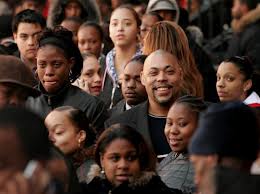
By James W. Breedlove
Recent economic data indicates the Great Recession of 2008 may be over. The DOW stock market index closed above 14,000, a level it had not attained since October 2007.
Consumer spending is up, inflation seems under control, weekly unemployment claims have decreased, and the housing market has stabilized,
Despite these signs that the recession is slowly recovering, statistics reported by the Labor Department show that blacks and older workers are finding it difficult to secure jobs. The overall unemployment rate of 7.9 percent which equates to 12.3 million workers has remained at that level since September of 2012.
While analysts have provided a variety of reasons for this “jobless recovery” the bottom line is employers are not hiring at rates commensurate with business growth. Corporate profits are increasing but they are not trickling down to the underclass devastated by the 2007 economic meltdown.
When the Great Recession hit many companies were forced to lay off workers to survive. As they struggled to do business in an uncertain environment they discovered that sophisticated software and automation let them operate their businesses more efficiently with fewer employees.
From giant corporations to university libraries to start-up businesses, employers are using rapidly improving technology to do tasks that humans used to do. Millions of workers are caught in a no win competition against machines that keep getting more powerful, cheaper and easier to use.
Entire employment categories, from secretaries to warehouse stockers to purchasing agents, are starting to disappear as barcodes and sensors are becoming standard on everything from tissue boxes to stamping machines on production lines. Robots read the codes and perform tasks as instructed by the adjustable software programs imbedded in them.
Most of the old jobs will never return, and millions more are likely to vanish as well, say experts who study the labor market. What’s more, these jobs aren’t just being transferred overseas and they aren’t just factory work. Increasingly, jobs are disappearing in the service sector, home to two-thirds of all workers.
Nearly one in five Black workers hold government jobs such as mail clerks, firefighters and teachers. The public sector has traditionally provided a less hostile environment to blacks.
But the public sector has cut nearly 600,000 jobs since 2009, due to shrinking government budgets and greater use of technology. This has contributed to the slower recovery for blacks in the labor market. A prime example is the downsizing in the U.S. Postal Service where blacks make up 75 to 80 percent of the employees in some of the major urban areas.
The numbers are startling and validate that the economy can grow with fewer workers. Nearly half of the 7.5 million jobs lost during the Great Recession were in industries that pay middle-class wages, ranging from $38,000 to $68,000. However, approximately 2 percent of the jobs gained since the recession ended in 2009 are in the same pay classification. Almost 70 percent are in lower-pay industries.
While creating the software and the apps that the sophisticated technology requires will require more software engineers and app designers the new technology is eliminating far more jobs than it is creating.
Annual reports such as The State of The Dream published by United for a Fair Economy and the State of Black America published by the National Urban League are informative and vividly depict the black/ white disparity in America. Activists such as Tavis Smiley and Cornel West add their voices to the conversation. But the organizations and the individuals offer solutions to the inequities that focus on government action.
These disparities were not initiated by the Great Recession of 2007, just publicized by it. Racial economic disparities have a much longer history with a legacy that extends back to the country’s founding fathers. Ignoring this reality will only result in the disparity gap growing wider.
With this historical reality in mind the task for black Americans becomes clear.
Blacks should not depend on government benevolence to mitigate the onerous burdens of economic disparity. History has shown that dependency on government programs is not and never has been the ultimate solution to black social, civil, political, or economic parity. The same government mindset that devised the three fifths compromise for counting blacks during the Constitutional Convention of 1787 has survived and is functionally operating today to maintain the inequities that are a prime component of all other disparities. As the American demographic changes and technology redefines jobs blacks cannot afford the luxury of waiting for the benevolence of the majority to achieve equity.
While governmental policy reforms should be aggressively pursued by black organizations, legislators, churches and activists they must not be the primary approach to achieve desired parity. Even with appropriate laws in place experience has shown that it is difficult at best and generally impossible to control the manner in which the law is implemented. Consider the tortuous path of Brown vs. Board of Education.
Blacks must plan and implement on both strategic and tactical levels the steps and timing that must be taken to accomplish the social, civil, economic and political goals they establish.
A pragmatic starting point would be to implement the God plan for financial prosperity as provided in Gen 42:34 (live on no more than 80 percent of income), Matt 25:14-30 (make your money work for you), and Matt 25:1-13 (capitalize on the opportunities that God provides).
This collective effort would become the cornerstone for correcting the disastrous black economic disparity on both an individual level and as a group.
Comments or opinions may be sent to the writer at: jaydubub@swbell.net.




